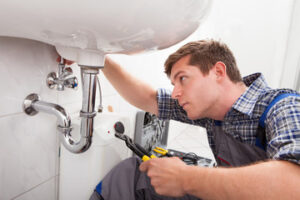A gutter is a pipe or trough along the roof’s edge that carries rainwater away from your home. Without gutters, water would overflow your roof and cause damage.
Gutters are necessary for any area that gets appreciable rainfall. Regularly cleaning your gutters will prevent common problems, including clogged drains, moss growth, leaky roofs, and foundation damage. Click the Visit Website to learn more.

Without gutters, rainwater would collect on the roof, where it can cause rot, deterioration, and mold. Water can also damage shingles, fascia boards, and siding. It can also lead to basement flooding and weaken a house’s foundation. Gutters help prevent these problems by directing rainwater away from the house.
To do this, the gutter system has downspouts that direct water from the roof to a drainage area or splash block. Splash blocks are often used to protect lawns from erosion. They can be installed above or below the downspout. They are especially helpful in areas that experience frequent heavy downpours.
A downspout is a long, hollow tube that carries water from the roof. They are usually shaped like a “V” or a “U”, and are made of aluminum, steel or copper. Aluminum is the most popular choice, because it is lightweight and rust-resistant. Steel is sturdier, but it can corrode over time. Copper is more expensive, but it is durable and rust-resistant. It is also less likely to corrode than aluminum or steel, and it has a more attractive finish.
During a heavy rainstorm, water may spill over the edge of the gutter and flood the landscaping around your home. This can damage plants, wash away mulch and gravel, and flood the soil that supports your home’s foundation. A well-designed and properly maintained gutter system is essential to protecting your investment.
Regularly cleaning your gutters can remove twigs, leaves and debris that can clog them. Gutter guards can keep leaves and twigs out of the gutter, so it is easier to maintain a clean and functioning system. Another effective way to divert water is with a downspout extension, which can be attached to the end of a downspout and helps control where it empties. It can be placed either above or below ground and is an affordable solution to improving gutter drainage. A drainage well is a more permanent option that can be constructed by excavating a hole in the yard and filling it with gravel. It’s a good idea to have these features professionally installed because they require excavation and are difficult to install incorrectly.
They prevent water damage to your roof.
Gutters collect rain, melting snow, and other precipitation and safely direct it away from your home. This is important because without gutters, this water would puddle or pool on the roof’s surface and soak through shingles, causing internal damage. When this happens, you may need to replace your roof or other structural components of your house. Gutters also help to prevent soil erosion around the foundation of your house. Water that pools in the soil can heave and push up against the foundation, damaging your home’s structure and potentially causing cracks in the walls and basement.
Another way that gutters protect your roof is by preventing moss growth. When water lingers on the roof and is not quickly removed, it can fertilize the moss growing along the shingle edges. This can cause the shingles to deteriorate, leading to leaks in your home’s ceilings and walls. Gutters remove water from your roof in a timely manner, keeping it safe and dry for the entire duration of a storm or melt.
In addition, a gutter system is vital for preserving your lawn and garden. Without a functioning drainage system, heavy flows of water can run off your roof and down the side of your house, causing soil erosion and flooding in low-lying areas around your garden and landscaping features. A new gutter system with strategically placed downspouts will safely direct the flow of water in a controlled fashion away from your property, preventing this erosion.
During the winter, insufficient gutter systems can lead to ice dams. When a roof’s gutters are clogged, melting snow is unable to drain off the roof and instead freezes. When the ice thaws, the resulting water backs up and seeps into your home’s walls, causing extensive damage. Gutters that are properly sized, installed, and maintained prevent this problem by ensuring that all water is drained from the roof in a timely fashion.
If you are concerned about the condition of your gutters or are looking for a gutter replacement service, contact the experienced roofing contractors at Able Roof. We can provide a free estimate and discuss your options. We serve clients in Portland, OR, and surrounding areas.
They protect your foundation.
When water pours off your roof and lands directly around your house, it creates pressure that can crack and damage the foundation. Gutters prevent this by directing the water to downspouts that drain away from your home’s foundation. This helps the soil re-adjust and keeps the water away from the foundation so it can dry and avoid major structural damage.
If your gutters are clogged, the water will spill over the sides and pool around your house. This can cause serious problems, especially in winter when the water freezes and expands. This can cause the ground around your house to sink and cause cracks in the foundation, walls and chimney.
Clogged gutters can also lead to mold, mildew and mosquitoes around your home. Mosquitos love standing water, so if your gutters are full of water they’ll become a breeding ground for mosquitoes all summer long.
A properly working gutter system should be able to drain the water at least 10 feet away from your home. If it isn’t, you may need gutter downspout extensions to keep the water flowing properly. These are a great solution to consider because they can easily be installed and can help keep the water flow away from your foundation, which will protect your house’s integrity.
Gutter downspout extensions are also a good way to prevent the water from overflowing your gutters. They are a great solution for homes with a lot of trees near the house, or for homes with expansive or erosion-prone soil. These extensions add extra length to the downspout and help ensure that the water is drained away from your house’s foundation before it has the chance to settle.
Gutters are an essential part of any home’s drainage system. They are designed to protect your home’s foundation and basement by preventing floods, mold, mildew and mosquitoes. They are an affordable investment that will keep your home safe and looking great.
They’re easy to install.
The DIY-friendly gutters available today are designed to make installation easy. They’re sold in 10-foot sections, which can be seamed together using a special gutter sealant. Each section is marked with a chalk line to mark where it needs to be hung, so you can align the gutter piece correctly with your roof. Once it’s installed, you can drive long screws that are attached to each seaming bracket into the fascia board of your house to hold it in place.
Gutter systems are also available in a variety of shapes and sizes. Some are designed with elbows that allow you to direct water flow. Others have downspouts, which are attached to the gutter with a leader pipe or strap.
Once the gutters are in place, they can be sealed with a waterproof caulk to protect against leaks. A good quality gutter system can last for years.
Another advantage of installing gutters is that they can improve your home’s curb appeal. They can prevent rust and other damage that may turn potential buyers away, and they’ll keep the value of your home up.
If you’re thinking of selling your home, having a functional gutter system can help you get top dollar for it. Gutter systems can prevent damage to your roof, foundation, and landscaping, and they can also save you money by reducing the amount of water that flows into your home.
Sanitation is a concern for all homeowners, and gutters are a great solution. They can help prevent mildew and mold growth, which can reduce indoor air quality and contribute to respiratory problems. By diverting water effectively, gutters can maintain a drier environment that is hostile to these fungi.
Gutters can be made from a variety of materials, including steel, aluminum, and copper. However, copper is the most durable and has a lifespan of decades or longer. It can also be recycled, which makes it a sustainable option for your gutters. If you choose to install a copper gutter, it’s important to seal all joints, end caps, and seams to prevent leaks.







